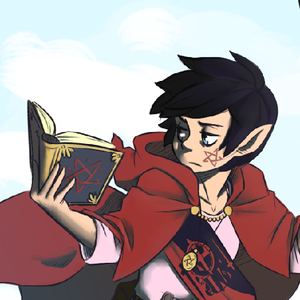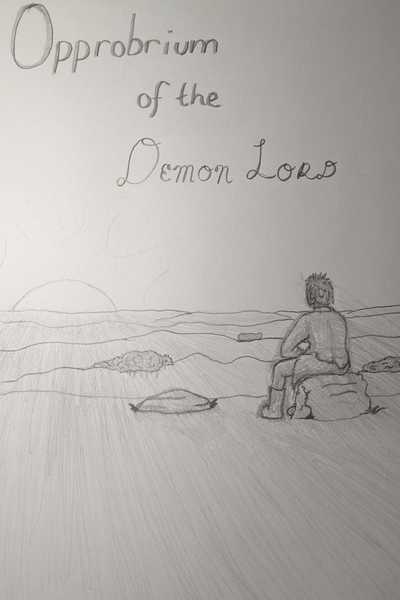"Thusly," Myra says, affecting her most imperious tone as she reads from the book in her hands. "It can be said the reign of the Great Evil was both the most calamitous and blessedly brief rulership to ever disgrace the continent of Syzan, if not all Telix itself."
She snorts, losing the pompous tone in favor of giggles. "What a crock of shit. You can't just posthumously claim a three-hundred-year kingdom 'didn't count.' I can't believe they called this guy an academic, he's basically a news crier for the Church."
For a book which promotes itself as a ‘rigorous and thorough examination of contemporary events through the Age,’ the thick-as-her-palm-is-wide leather-bound Treatise on the Holy Scripture seems to be made of feathery speculation and egregious propaganda. If not for the writing's tone and arrogant sneering through every self-important sentence, it would be a truly useful piece of literature. Few other works still available have ever shown more than a glimpse of the past, but the cited evidence for Treatise paints a much more vivid picture of the Church's rise to power after the Demon Lord wiped out its seat of power.
She snaps the text shut and pushes it back into the shelf of her bedroom, the only concession to how much time she spends here alone, and the only properly dust-free items around. The rest of the space is austere and old as fuck, not to mention somehow less comfortable than sleeping on the actual wooden floor. To say nothing of the window which reaches up from that floor to arc gracefully near the ceiling, giving a perfect view of the building's very, very overgrown enclosed courtyard.
Letting her thoughts wander, Myra drags her fingertips along the spines of the shelf's contents, eyes hardly registering the many similar colors and few that stand out. Only the most recent works have proper and intact bindings, cloth-bound wood and paper stitched together in a manner most conducive to reading, their covers dyed and painted to hold titles, authors, or even a sigil or small picture.
Her fingernail catches on a book, the sensation tearing her out of her thoughts. She finds a loose thread from a bright green spine wedged into a tiny split in her nail, and carefully dislodges it before retrieving the offending book from the shelf.
"Ooh, pretty," she murmurs, finding its cover fades into near-black at its edges. It doesn't look familiar, despite having read every title and added nothing to the shelves. No title is legible on the cover or spine, and there is only a single page of preamble before the titled segments begin. The book's script is looping, far less angular than what she’s used to, and the dialect is a little strange, but she can still read it fairly easily thanks to now painful familiarity with Church script.
It is the greatest feat of human minds to find, within one's own self, the courage to deny all of creation's preached and pretended purpose.
It is also, of course, the most dangerous. The Gods are quite real, even in their silence, and no part of this text will claim or behave as if any other possibility were true.
That being said, many of these stories predate what the Church has deemed doctrine, certainly my own time, so take to heart that they will care not for our contemporary mores. I daresay the far future as well might find them all the more objectionable, but I am simply a scholar forging records, no Gazer or truthsayer.
So, to whoever may find this collection, please take care: this is not a work of worship, nor is it a log of failures. These are the words of history, which should not be forgotten even as we learn to reject them. After all, should they become our enemies, these tales and fables, it will be all the better to know them and understand them, in order to overcome them.
And if this is a read of fancy to you, do pardon the tone. It is uneven, written over the course of years which did not all match in event or import.
Lastly, be you friend or foe to the words beyond this page, allow me to beg of you one thing: do not let the light of knowledge die for some pithy little thing as doctrine. Lock it away, bury it if you must.
But, a thousand-year curse on any who would destroy what lies within these pages.
Myra rereads it a few times, finding more questions behind the words she thought might hold answers. It isn’t long before she turns the page, wondering if the whole text will be so cryptic.
At least this part has clear direction.
THE HENGE
To qualify any collection of lore which describes the world we live in, at least that which encapsulates this southernmost continent of Syzan, it would be a risible error to not start with the oldest of them all.
The date of its construction is lost. Even the oldest folk tales and epic poems which mention it have only reference to its age, its grandeur, its relevance to immediate events. That the Age of War brought about so much destruction for its countless centuries only secures for us a single truth:
The Henge will outlast us all.
Historically, the place of the Traitor’s last stand, and once counted as the singular place of utmost regard even above the Church, its unfailing walls and indomitable citadel reign sentinel over the vast and bountiful plains surrounding it. Per legend, the seat of the oldest crown, and an eternal source of embarrassment for the present royal family as none of the Parthin Kingdom’s line has ever claimed the seat of the Henge (most consider this a sign that the bloodline is dead, while others rally behind it as a point of contention with royal legitimacy. As mentioned before, this is simply a record of their opinions, not advocacy of them.)
Stepping out into the hall, Myra looks out the window there to peer at the silhouette of the Cathedral’s towering walls. If not for the too-near horizon of cliffs cutting an early sunset out of the sky, she would believe it to be the Henge described by the pages in her hands. However, the broad hill upon which the Cathedral is built is surrounded by that near-perfect circle of great cliffs, surrounded by the chasm like a moat surrounding castle walls.
The fields of not-quite-ivy which stretch from the ruins of the outer walls all the way to the false horizon of the cliffs glow a deep reddish-purple in the dark. It’s unsettling, and an absolute bar against sneaking through them at night. No bountiful plains here without some terrible event to destroy such a thing. Not like that could happen, unless the Gods themselves got involved. Which, if the book in Myra’s hands is anything to go by, could very well have been the case.
She returns to her room and lights a few more candles to read by, setting the book on her desk. Austere the room may be, it at least has enough furniture to suit all of a day’s needs.
She’s just glad it also has a firebox and striker, buried in the back of a desk drawer.
At the time of this writing, all that remains in the historical record is spurious accounts of lorekeepers and talespinners, the sorts of bards who embellish a story out of habit more than a need to entertain. Fairy tales, as it were, not that the Church would ever admit such folks exist.
Those are for a later entry, however. Before that, the details of the Henge which stand up under visitation (of which I made many in my pursuit of truth) are listed hereafter, though a significant space is left for further discoveries. After all, a place so large and yet so unknown must hold mysteries untold.
True to word, the next several pages describe maze-like corridors, peerless walls which narrow the sky to a circle one might imagine grasping, and the vine-ridden exterior of the Citadel.
In the three months Myra’s been at the Cathedral, she’s only been to the central building a few times. The more she reads of the Henge, though, the more it brings to mind the Cathedral. All that’s missing is reference to the Chamber of Light and the distinctly un-plains-like land around it. For something so central, so important as to have a full ceiling to itself from the ground floor, its absence in the text (as well as that of the very building she resides in) assures her it must be a different, albeit similar, place.
Not all that convincingly, though.
Morning brings the usual cycle of punishment-oriented rituals. Prayers before breakfast for piety. A breakfast of hard tack and salty broth, bookended by prayers of thanks for such a miserable meal. And, because the morning wouldn’t be complete without bashing their heads into the brick wall of religiously-enforced guilt, an extended lecture on history.
“Thank you all for being on time,” the Matron says, her hands folded in front of her. She leans against the desk with all the relaxed confidence of an interrogator, and it gives Myra chills. “I expect a few of you will have certain questions after this lecture, but I assure you there is ample time to respond to them. So please, unless it's urgent, resist your comments until I am finished.”
“Yes, Matron,” she replies, in unison with the other two girls. Lorhn and Kassi are no less snippy after two months of Church duties, and their names stick in Myra's throat like sludge after a long vomit.
“Wonderful. Today we are going to begin the section of your education where we discuss the vilest beings to walk this world. I am of course speaking of the Demons.”
The students all nod along, some paying much more attention than others.
“First, I will remind you all what Demons truly are. During the Age of War, it is known a great many individuals were granted incredible powers by the Gods. They were named startouched, and their abilities extended far beyond the scope of what powers existed in the day.
“After centuries of war, many of these individuals sought to supplant or support their dwindling armies of faith and received the power to summon terrible creatures. Fiery wolves, shadow-clad steeds, and even the terrible pegusi were drawn into the world by minds set only on war. These monsters became the ancestors of monsters who roam our lands to this day. It is a blessing they do not reproduce as often as deer and wolves, or we would be overrun with them.
“However, this was not enough for some of the startouched. They desired more control, more power, and gained the ability to not just call monsters, but create them. These new inventions, crafted by blood-soaked hands, often can be found at the roots of ghost stories and legends. Shades, which eternally wreak havoc upon those who cross their paths, accursed siegebeasts which blessedly prefer the icy chill of the far south, and which could topple even the walls of our grand Cathedral. These 'designed monsters' have outlived their intended purpose and still roam the world today as Demons.
“Most notable of all, of course, is the Demon sealed within this very place. A relic of the Age of War that resurfaced three millennia after the Age of Peace had begun. Whose exploits brought that age to its end. It is said that in less than three years, it destroyed the whole of the Parthin Kingdom with its terrible power, and only the work of a saint, not just startouched but blessed above and beyond by the whole host of the Hundred Named Gods, was able to seal the evil beast away.
“Yet, the prison is imperfect. Its power fades over time and must be replenished regularly. This is why we sing the Prayer of Sleep each year, to restore that prison and ensure the Demon can not ever escape.”
Lorhn raises her hand, and the Matron gives her a tight-lipped expression before nodding.
“Are we sure it’s the same demon? I can't imagine a song keeping it under if it's really so powerful."
“Of course we are,” the answer comes instantly. “No other Demon is named, though that vulgarity has now been lost to time. It is the only one to have required such efforts to seal away. Imagine the bloodshed of such a creature in an age when there is no magic to counter it.”
That thought drains the blood from the faces of her peers, but Myra only finds it fascinating. Before she realizes it, her own hand is raised.
“Myra, how unusual for you to participate voluntarily. You may speak.”
“I’m just wondering, do we know how magic disappeared?”
The Matron shifts uncomfortably, hands fidgeting briefly. “No, we do not. Some blame the Demon, and some say the Gods revoked it, but there is no certainty magic ever truly existed as you might believe. It was no all-encompassing power, and through the centuries the High Gazers have read those tales as the self-same blessings of the Gods as they were in the Age of War.”
“But… the seal is magic, isn’t it?”
“Of… of a sort, I suppose.”
“And the Prayer of Sleep must also be magic, then, to continue powering the magic seal?”
Now the Matron looks mortified, and she quietly shrugs.
“Then the Prayer of Sleep is the only way for anyone to perform magic, now? Who made that decision? Wouldn't it be better to have more people more capable of actually going against such a creature?”
At that, the Matron looks incredibly disturbed for a moment before recomposing herself.
“That is an excellent question for a future class. I think we shall end a bit early today, I am feeling somewhat faint. Do take care not to waste this bit of free time, girls.”
All three students nod and stand from their seats, but hardly begin to collect their books before the Matron is leaving the room.











Comments (0)
See all